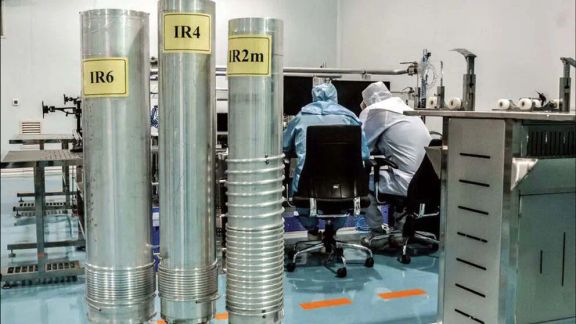Iran agrees to tougher oversight at nuclear site, IAEA reports

Iran has accepted tougher monitoring by the UN nuclear agency at its Fordow site after it greatly accelerated uranium enrichment to close to weapons grade there, the watchdog said on Thursday in a report seen by Reuters.
"Iran agreed to the Agency's request to increase the frequency and intensity of the implementation of safeguards measures at FFEP (Fordow Fuel Enrichment Plant) and is facilitating the implementation of this strengthened safeguards approach," the International Atomic Energy Agency said in the confidential report to member states.
On Wednesday, Laurence Norman of the Wall Street Journal tweeted that Iran will give more access to monitors from the UN’s International Atomic Energy Agency (IAEA) after banning one third of the agency's team last year, citing officials. Measures are being put in place “to ensure Tehran’s increased 60% production doesn’t lead to diverted fissile material or a sudden push to weapons grade” uranium, he said.
Norman wrote that among the measures, there will be “more frequent IAEA inspections of Fordow and a few more inspectors”.
It is a turnaround for Tehran which last year banned around one third of the IAEA’s inspectors, accusing them of being politically motivated.
“The inspections to Fordow won’t however be daily,” Norman added, expecting an updated IAEA report soon.
Last week, the IAEA’s chief, Rafael Grossi, said: "Today the agency is announcing that (Iran's) production [uranium] capacity is increasing dramatically of the 60% inventory."
In an interview with Reuters in Bahrain, he said that Iran had been producing uranium enriched to up to 60% at a rate of approximately 5-7 kilograms per month, adding that the figure is now expected to increase significantly, "seven, eight times more, maybe even more."
Norman said that the latest move by Tehran “gives Iran an easy leverage item next time they face a censure”.
Writing on X, he said: “They can threaten to withdraw additional oversight. But it’s worth noting that would be a comp safeguards breach. Not a JCPOA breach. So that would be a more serious issue.”
Also last week, a US intelligence report from November revealed that Iran could rapidly build a nuclear weapon should it decide to do so.
"The Intelligence Community continues to assess that as of 26 September 2024, Iran is not building a nuclear weapon. Tehran has, however, undertaken activities that better position it to produce one, if it so chooses," the Office of the Director of National Intelligence report said.
"Iran has continued to increase its stockpiles of 20-percent and 60-percent enriched uranium, manufacture and operate an increasing number of advanced centrifuges, and publicly discuss the utility of nuclear weapons," the report added.